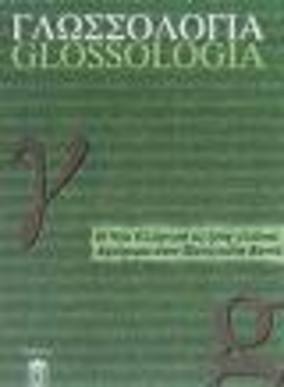Νέες απόψεις γύρω από το ζήτημα του απαρεμφάτου στις βαλκανικές γλώσσες
Part of : Γλωσσολογία ; Vol.2-3, 1983, pages 91-98
Issue:
Pages:
91-98
Section Title:
Άρθρα = Articles
Author:
Abstract:
The well-known and oft-cited convergence among the Balkan languages with respect to the near or complete loss of the infinitive is reexamined here. The standard handbook accounts (e.g. Sandfeld 1930, Schaller 1975, Solta 1980) of this Balkan phenomenon are shown to be deficient in three ways: the facts from each language are vastly oversimplified, the convergence is all that is stressed even though there are significant divergences among the languages on this point, and finally the causes of the developments with the infinitive throughout the Balkans are not fully elaborated.For instance, the handbooks generally overlook the existence of forms like γράψει in Modern Greek which occur in the perfect tense with 'have' (e.g. έχω γράψει 'I have written'). This formation is fully productive and continues the Ancient Greek and Medieval Greek infinitive (γράψει from Medl. Grk. γράψειν, an analogical replacement for Anc. Grk. γράψαι). While noteworthy as a productive continuation of the earlier infinitive, such forms though seem not to require a category "infinitive" for the modern language since they are of such limited function in the grammar overall. Thus despite γράψει (etc.), Modern Greek really does lack an infinitive, as the handbooks indicate. This more detailed examination, though, allows for the determination of the dating of the loss of the category infinitive in Greek, i.r. the point at which forms like γράψει came to be restricted to use only in the perfect tense.Furthermore, it can be shown that the Balkan languages diverge with regard to the infinitive in one important way. In particular, Albanian has undergone a revival of the category infinitive, thus running counter to the general Balkan trend, and it can also be demonstrated that Medieval Greek as well experienced a similar but short lived functional and formal renewal of the category infinitive.Finally, the extreme positions generally taken in discussions of the causes of the loss of the infinitive - language-external causes (language contact) on one end and language-internal independent developments on the other- are shown each to miss some crucial aspect of causation. A more synthetic view, utilizing a combination of internal developments within each language and the effects of language contact, is advocated here. Among other benefits, this account allows for divergences such as found with the revival of the infinitive in Albanian and Medieval Greek.
Subject:
Subject (LC):
Notes:
Περιέχει σημειώσεις, Πρέπει να ευχαριστήσω τον καλό μου φίλο Τάσο Χριστίδη του Αριστοτελείου Πανεπιστημίου Θεσσαλονίκης για τη βοήθειά του στην φραστική διατύπωση αυτού του άρθρου, το οποίο αρχικά ήταν μια διάλεξη στο Σπουδαστήριο Γλωσσολογίας του Αριστοτελείου Πανεπιστημίου της Θεσσαλονίκης, τον Ιούνιο 1981. Όλες οι ιδέες εδώ παρουσιάζονται με πιο εκτεταμένο τρόπο στο βιβλίο μου The Synchrony and Diachrony of the Balkan Infinitive: A Study in Areal, General, and Historical Linguistics (Cambridge University Press, Cambridge Studies in Linguistics Supplementary Volume, 1983).




